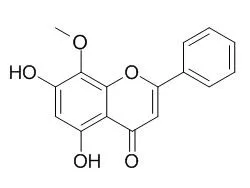| Kinase Assay: |
| Vascul Pharmacol. 2015 May 5. | | Wogonin inhibits LPS-induced vascular permeability via suppressing MLCK/MLC pathway.[Pubmed: 25956732] | Wogonin, a naturally occurring monoflavonoid extracted from the root of Scutellaria baicalensis Georgi, has been shown to have anti-inflammatory and anti-tumor activities and inhibits oxidant stress-induced vascular permeability. However, the influence of Wogonin on vascular hyperpermeability induced by overabounded inflammatory factors often appears in inflammatory diseases and tumor is not well known. In this study, we evaluate the effects of Wogonin on LPS induced vascular permeability in human umbilical vein endothelial cells (HUVECs) and investigate the underlying mechanisms.
METHODS AND RESULTS:
We find that Wogonin suppresses the LPS-stimulated hyperactivity and cytoskeleton remodeling of HUVECs, promotes the expression of junctional proteins including VE-Cadherin, Claudin-5 and ZO-1, as well as inhibits the invasion of MDA-MB-231 across EC monolayer. Miles vascular permeability assay proves that Wogonin can restrain the extravasated Evans in vivo. The mechanism studies reveal that the expressions of TLR4, p-PLC, p-MLCK and p-MLC are decreased by Wogonin without changing the total steady state protein levels of PLC, MLCK and MLC. Moreover, Wogonin can also inhibit KCl-activated MLCK/MLC pathway, and further affect vascular permeability. Significantly, compared with wortmannin, the inhibitor of MLCK/MLC pathway, Wogonin exhibits similar inhibition effects on the expression of p-MLCK, p-MLC and LPS-induced vascular hyperpermeability.
CONCLUSIONS:
Taken together, Wogonin can inhibit LPS-induced vascular permeability by suppressing the MLCK/MLC pathway, suggesting a therapeutic potential for the diseases associated with the development of both inflammatory and tumor. | | Eur J Pharmacol. 2014 Aug 15;737:57-69. | | Wogonin inhibits LPS-induced tumor angiogenesis via suppressing PI3K/Akt/NF-κB signaling.[Pubmed: 24858369] | Wogonin has been shown to have anti-angiogenesis and anti-tumor effects. However, whether Wogonin inhibits LPS-induced tumor angiogenesis is not well known. In this study, we investigated the effect of Wogonin on inhibiting LPS-induced tumor angiogenesis and further probed the underlying mechanisms.
METHODS AND RESULTS:
ELISA results revealed that Wogonin could suppress LPS-induced VEGF secretion from tumor cells. Transwell assay, tube formation assay, rat aortic ring assay and CAM model were used to evaluate the effect of Wogonin on angiogenesis induced by MCF-7 cell (treated with LPS) in vitro and in vivo. The inhibitory effect of Wogonin on angiogenesis in LPS-treated MCF-7 cells was then confirmed by the above in vitro and in vivo assays. The study of the molecular mechanism showed that Wogonin could suppress PI3K/Akt signaling activation. Moreover, Wogonin inhibited nuclear translocation of NF-κB and its binding to DNA. The result of real-time PCR and luciferase reporter assay suggested that VEGF expression was down-regulated by Wogonin primarily at the transcriptional level. IGF-1 and p65 expression plasmid were used to activate PI3K/Akt and NF-κB pathways, and to observe the effect of Wogonin on the simualtion of PI3K/Akt/NF-κB signaling.
CONCLUSIONS:
Taken together, the result suggested that Wogonin was a potent inhibitor of tumor angiogenesis and provided a new insight into the mechanisms of Wogonin against cancer. |
|
| Cell Research: |
| Biochem Pharmacol. 2014 Nov 15;92(2):220-34. | | Wogonin reverses multi-drug resistance of human myelogenous leukemia K562/A02 cells via downregulation of MRP1 expression by inhibiting Nrf2/ARE signaling pathway.[Pubmed: 25264278] | Constitutive NF-E2-related factor 2 (Nrf2) activation has been recently reported to play a pivotal role in enhancing cell survival and resistance to anticancer drugs in many tumors. Previously, much effort has been devoted to the investigation of blocking Nrf2 function in cultured cells and cancer tissues, but few researches have been undertaken to evaluate the precise mechanism of flavonoids-induced sensitivity by inhibiting Nrf2. In this study, we investigated the reversal effect of Wogonin, a flavonoid isolated from the root of Scutellaria baicalensis Georgi, in resistant human myelogenous leukemia.
METHODS AND RESULTS:
Data indicated that Wogonin had strong reversal potency by inhibiting functional activity and expression of MRP1 at both protein and mRNA in adriamycin (ADR)-induced resistant human myelogenous leukemia K562/A02 cells. Consequently, the inhibition of MRP1 by Wogonin was dependent on Nrf2 through the decreased binding ability of Nrf2 to antioxidant response element (ARE). Further research revealed Wogonin modulated Nrf2 through the reduction of Nrf2mRNA at transcriptional processes rather than RNA degradation, which is regulated by the PI3K/Akt pathway. Moreover, DNA-PKcs was found to be involved in the Wogonin-induced downregulation of Nrf2 mRNA at transcriptional levels.
CONCLUSIONS:
In summary, these results clearly demonstrated the effectiveness of using Wogonin via inhibiting Nrf2 to combat chemoresistance and suggested that Wogonin can be developed into an efficient natural sensitizer for resistant human myelogenous leukemia. |
|






 Cell. 2018 Jan 11;172(1-2):249-261.e12. doi: 10.1016/j.cell.2017.12.019.IF=36.216(2019)
Cell. 2018 Jan 11;172(1-2):249-261.e12. doi: 10.1016/j.cell.2017.12.019.IF=36.216(2019) Cell Metab. 2020 Mar 3;31(3):534-548.e5. doi: 10.1016/j.cmet.2020.01.002.IF=22.415(2019)
Cell Metab. 2020 Mar 3;31(3):534-548.e5. doi: 10.1016/j.cmet.2020.01.002.IF=22.415(2019) Mol Cell. 2017 Nov 16;68(4):673-685.e6. doi: 10.1016/j.molcel.2017.10.022.IF=14.548(2019)
Mol Cell. 2017 Nov 16;68(4):673-685.e6. doi: 10.1016/j.molcel.2017.10.022.IF=14.548(2019)